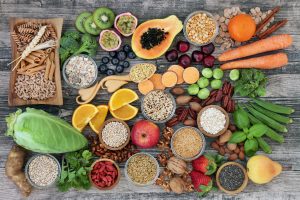You’ve probably heard of trans fats before. And I’m sure what you have heard was not good news. This new news is not much different, except that the World Health Organization just announced that it plans to eliminate synthetic trans fats completely from the food supply by the year 2023.
What are trans fats?

Trans fats are found in small amounts in whole fat dairy products and fatty meats. However, the majority of such fats is artificial. This artificial trans fat is formed from a process called hydrogenation. This word may look familiar from food labels since a lot of processed products contain hydrogenated forms of certain oils. In other words, oils like vegetable oil have hydrogen added to it. This makes the oil become solid at room temperature. This type of fat is less likely to spoil, which is likely why a lot of fast food restaurants use it for their fryers.
Over the years, research has shown that these types of fats increase risk of heart attack, stroke, and type 2 diabetes. It can also decrease you HDL, or “good” cholesterol, and increase your LDL, or “bad” cholesterol. These health risks are the major reason why the use of such fats in foods has gone down over the past several years.
What foods contain trans fats?
Fast foods like fries, doughnuts, or fried chicken commonly contain trans fats. However, baked goods like pies, or ready-made frostings are also a source of trans fats. Many companies though have already taken these types of fats out of their products. This is since the original statement from the Food and Drug Administration in 2013 that deemed trans fats no longer “generally recognized as safe.”
Trans Fat Ban by 2023
The World Health Organization (WHO) released on May 14, 2018, a guide called REPLACE. This step-by-step guide provides instructions on how to eliminate trans-fatty acids from the global food supply. The six actions involved in this program includes:
REview food sources of industrially-produced trans fats in the global landscape.
Promote the replacement of industrially-produced trans fats with healthier fats and oils.
Legislate or enact regulations to eliminate industrially-produced trans fats.
Assess and monitor the use of industrially-produced trans fats in the food supply as well as rates of consumption of such fats in the global diet.
Create widespread awareness of the negative health impact of trans fats.
Enforce compliance of policies and regulations involving industrially-produced trans fats.
Similar bans in Denmark and New York City in recent years have found that death rates from heart attacks went down significantly. Therefore, WHO hopes to eliminate trans fat from the food supply by the year 2023. This is part of the United Nation’s Sustainable Developmental Goals that hopes to reduce premature death from noncommunicable diseases by one-third by the year 2030.
Stick to healthy fats
Just because trans fats will be taken out of the food supply, that does not mean taste of foods will be affected. There are many healthier types of fats and oils that can replace artificial fats and will be better for your health. Such healthier fats and oils include:
- Olive oils
- Peanut oil
- Fats from plant-based foods like avocado, nuts, seeds, and nut butters
- Fats from fatty fish like salmon, albacore tuna, trout, or sardines
Other ways to reduce risk of heart disease
Besides replacing unhealthy fats with healthier fats, there are other ways to reduce your risk of heart disease and type 2 diabetes that include:
- Staying active for at least 30-40 minutes a day most days with moderate activity like walking.
- Reducing stress by talking out problems with a counselor, engaging in yoga or meditation, or performing relaxation breathing.
- Quitting unhealthy lifestyle behaviors such as drinking alcohol or smoking.
- Taking heart healthy supplements such as Alestra by Vita Sciences. Alestra contains natural ingredients like niacin, plant sterols, and garlic that research shows may help maintain healthy cholesterol levels and promote heart health.
-written by Staci Gulbin, MS, MEd, RD, LDN
Sources:
American Heart Association (March 29, 2018) “Lifestyle Changes for Heart Attack Prevention.”
Food and Drug Administration (June 16, 2015) “FDA Cuts Trans Fat in Processed Foods.”
Mayo Clinic (March 1, 2017) “Trans fat is double trouble for your heart health.”
Wolfram, T. (March 6, 2017) “Choose Healthy Fats.” Academy of Nutrition and Dietetics, eatright.org
World Health Organization (May 14, 2018) “WHO plan to eliminate industrially-produced trans-fatty acids from global food supply.”
 It’s Friday night and the weekend is just beginning. After a long week of work, you may be thinking about that glass of wine or pint of beer to help you relax. In moderation, there is nothing wrong with a few drinks on the weekend. However, a recent study has found that drinking more than the suggested amount each week can shorten your life.
It’s Friday night and the weekend is just beginning. After a long week of work, you may be thinking about that glass of wine or pint of beer to help you relax. In moderation, there is nothing wrong with a few drinks on the weekend. However, a recent study has found that drinking more than the suggested amount each week can shorten your life. Nearly half of all Americans have high blood pressure, or hypertension. Having hypertension can put you at increased risk for heart disease and stroke, which are two of the top five leading causes of death in the United States. Therefore, it is important that if you have high blood pressure that you should work to be more heart healthy to prevent chronic disease. This usually includes eating a heart healthy diet and exercising. However, a recent survey shows that exercise is the last thing people want to do to try and lower their blood pressure.
Nearly half of all Americans have high blood pressure, or hypertension. Having hypertension can put you at increased risk for heart disease and stroke, which are two of the top five leading causes of death in the United States. Therefore, it is important that if you have high blood pressure that you should work to be more heart healthy to prevent chronic disease. This usually includes eating a heart healthy diet and exercising. However, a recent survey shows that exercise is the last thing people want to do to try and lower their blood pressure. With the summer months approaching and weather warming, weight loss may be on your mind. With every click of the remote, there are commercials advertising weight loss plans, exercise equipment, and fat burning supplements claiming to help you manage your weight. However, a recent study has shown that regular eating versus dieting may be the answer to long term weight loss and management.
With the summer months approaching and weather warming, weight loss may be on your mind. With every click of the remote, there are commercials advertising weight loss plans, exercise equipment, and fat burning supplements claiming to help you manage your weight. However, a recent study has shown that regular eating versus dieting may be the answer to long term weight loss and management. Eat your veggies, they say. Whether you are trying to lose weight, improve your blood pressure, or just simply trying to live well, you may be told to eat more fiber in your diet. Fiber is not only good for managing weight or keeping your heart healthy though. A recent study has found that more fiber in your diet may actually help improve the health of those with type 2 diabetes.
Eat your veggies, they say. Whether you are trying to lose weight, improve your blood pressure, or just simply trying to live well, you may be told to eat more fiber in your diet. Fiber is not only good for managing weight or keeping your heart healthy though. A recent study has found that more fiber in your diet may actually help improve the health of those with type 2 diabetes. Heart disease is the number one cause of death for both mean and women in the United States. Therefore, it is no surprise that researchers are looking endlessly for ways to reduce risk of this condition. A recent study has found that for those with diabetes, the earlier diagnosis, the lower the heart disease risk later on in life.
Heart disease is the number one cause of death for both mean and women in the United States. Therefore, it is no surprise that researchers are looking endlessly for ways to reduce risk of this condition. A recent study has found that for those with diabetes, the earlier diagnosis, the lower the heart disease risk later on in life. There’s nothing better than coming home after a long and stressful day of work or school, and having a happy wagging tail waiting at the door for you. Owning a pet involves a lot of work and cost. However, studies show that a pet may be worth the time and money for the good of your health. A recent study review has shown that having a pet can decrease anxiety and provide overall benefits to anyone suffering from mental health issues.
There’s nothing better than coming home after a long and stressful day of work or school, and having a happy wagging tail waiting at the door for you. Owning a pet involves a lot of work and cost. However, studies show that a pet may be worth the time and money for the good of your health. A recent study review has shown that having a pet can decrease anxiety and provide overall benefits to anyone suffering from mental health issues. Vitamin D, known as the sunshine vitamin, is a very important nutrient for overall health. Best known for its work in helping strengthen bones and teeth, vitamin D is starting to get more attention for other benefits it could provide. A recent study reports that cells damaged by heart attack or stroke may be repaired by vitamin D3.
Vitamin D, known as the sunshine vitamin, is a very important nutrient for overall health. Best known for its work in helping strengthen bones and teeth, vitamin D is starting to get more attention for other benefits it could provide. A recent study reports that cells damaged by heart attack or stroke may be repaired by vitamin D3. Do you get stabbing abdominal cramps after eating a fatty meal? Does dairy or gluten cause uncomfortable gas and bloating? Are doctors unsure of the origin of your chronic constipation or diarrhea? If you answered yes to any of these questions, then you may have what is called Irritable Bowel Syndrome (IBS). Although changes in the diet may be helpful in many cases of IBS, research shows that vitamin D may also help those with this condition.
Do you get stabbing abdominal cramps after eating a fatty meal? Does dairy or gluten cause uncomfortable gas and bloating? Are doctors unsure of the origin of your chronic constipation or diarrhea? If you answered yes to any of these questions, then you may have what is called Irritable Bowel Syndrome (IBS). Although changes in the diet may be helpful in many cases of IBS, research shows that vitamin D may also help those with this condition. Like millions of other people, you may be hoping to lose some weight in this new year. However, the confusing part may be what eating plan, or shall I say “diet,” should you choose to follow? There is so much information in the media today making all sorts of weight loss claims. They may all seem promising, but not all may provide you the nutrients you need to succeed long-term. However, a recent report found that the DASH diet may be the answer to get you to your weight loss goal.
Like millions of other people, you may be hoping to lose some weight in this new year. However, the confusing part may be what eating plan, or shall I say “diet,” should you choose to follow? There is so much information in the media today making all sorts of weight loss claims. They may all seem promising, but not all may provide you the nutrients you need to succeed long-term. However, a recent report found that the DASH diet may be the answer to get you to your weight loss goal.